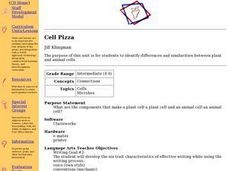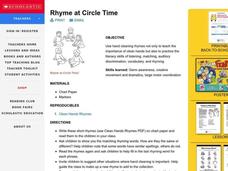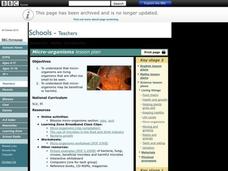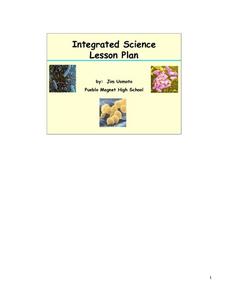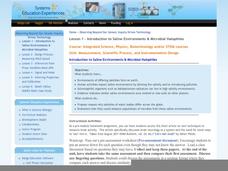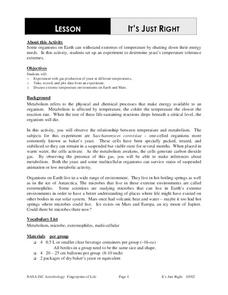Curated OER
Cell Pizza
Students identify parts and functions of microscope. Students watch video, Cells and Life about cell parts with actual pictures and actual cells. Students discuss video and identify parts of the cells that animals and plants have in...
Curated OER
Tag the Germs
Students review what happens when they wipe germs off their hands with a wet wipe. Next, they play a game of tag in which some students are germs and others are wipes. They move around while music plays, stop when it stops, and the wipes...
Curated OER
Rhyme at Circle Time
Students study the importance of clean hands and practice the literacy skills of listening, matching, auditory discrimination, vocabulary, and rhyming. They illustrate their rhyme chart with drawings or photos taken doing the different...
Curated OER
Micro-Organisms
Students investigate microscopic life by viewing video clips. In this organisms lesson, students view photographs and video clips on the internet of micro-organisms and discuss the harms and benefits of the creatures. ...
Curated OER
The Nature of Disease
In this disease worksheet, students read information about infectious diseases, how they are transmitted, and how they are treated. Students then complete 6 fill in the blank questions.
Curated OER
Dirty Decomposers
Students explore the ecosystem by conducting a ziploc bag experiment. In this recycling lesson, students identify decomposer organisms in our environment and how they speed up the recycling process. Students utilize a ziploc plastic bag,...
Curated OER
Introduction to Bacteria
Beginning biologists survey several websites to learn about the types, structure, motility, feeding habits, and reproductive methods of bacteria. All websites are linked to the lesson plan, so you can have individuals access it and click...
Curated OER
Chapter 16, Food Biotechnology
Although the points given on these slides are valid, the visual accessibility is poor. Consequently, many viewers would be distracted or entirely unable to view the presentation. The content is a review of microorganisms and their...
Curated OER
Scientific Method Unit: Bacteria
Students discover how to apply the steps of the inquiry process through the study of bacteria. Working in groups of four, they cooperatively read an article about bacteria and complete a graphic organizer. Group members share with others...
Curated OER
"Investigating Soil Color and Texture"
Ninth graders will identify/understand the differences between soil and dirt. They will classify soil color accurately and use Munsell notation to describe it (Munsell books provided).Students will classify soil texture using the feel...
Curated OER
Land Quality Issues
For this unit of lessons, students examine land quality issues. They discover food chains and practice reading them. They also examine the erosion of soil and how it affects the environment.
Curated OER
Smears
In this biology worksheet, students are shown how to prepare a smear and then answer some review questions that address the proper preparation of a sample.
Curated OER
A Safe Food Supply? Is Your Food Safe to Eat?
Viewers of this slide show learn that pesticides used on food crops can be harmful, but that there are certain allowable levels that should not be hazardous. They find out the rigorous process of inspection that meat must go through...
Institute for Systems Biology
Introduction to Saline Environments & Microbial Halophiles
If you do not mind wading through unrelated headings (This is not for a physics or STEM course, as it states.) and content (The lesson opens with an article about neurology, not halophiles.), then you will find a valuable resource on...
Curated OER
What Sticks Can Make You Sick
Learners study adhesins and their receptors. In this science inquiry lesson students experiment to find adherence and use agglutination to identify adhesins.
Curated OER
Zoology Word Search Puzzle
In this science activity, middle schoolers look for the words that are related to the concept of zoology that is reviewed in the sheet. They also acquire new vocabulary.
Curated OER
Microbial Contaminants in Drinking Water
When presented with three unopened bottles of water, learners are asked to tell decide which one is contaminated with a microbe. Students work in small groups and role play being a Microbiologist, a patient, or a recorder. The patient is...
Curated OER
Sorting
Learners study how things are stored and how information is retrieved. In this investigative lesson plan students play a game that helps them to see how things are sorted in a library.
Curated OER
Defense Against Infectious Diseases
In this infectious disease defense worksheet, high schoolers will review the immune system including acquired, antibody, and cellular immunity. Students will then compare passive and active immunity to infectious diseases. This worksheet...
Curated OER
The Nature of Disease
In this diseases worksheet, students will learn about infectious diseases including what causes a diseases and how they are spread. Students will also review symptoms of disease, patterns of diseases, and treating diseases. This...
Curated OER
Inquiry into Infectious Disease: It's a Germy World After All
Students choose a question from a given list and develop an investigation about it. In this biology instructional activity, students analyze bacterial growth by carrying out a guided experiment. They present their findings in class.
Curated OER
An Ancient Disease: Who Am I?
Sixth graders research the positive and negative aspects of microorganisms noting the challenges faced by early scientists. They investigate the history of a disease of their choosing and write a summary of their findings.
Curated OER
It's Just Right
Students conduct an experiment to determine the temperature tolerance of yeasts. In this biology lesson, students collect data and compare them by plotting graphs. They explain how extreme temperatures affect organisms.
Curated OER
The Effects of Ultra-Violet Light on Yeast
Learners work in small groups collecting and analyzing data as they learn how to best grow yeast. This lesson allows students to conduct several student-created experiments as they continually generate questions and hypotheses. ...
